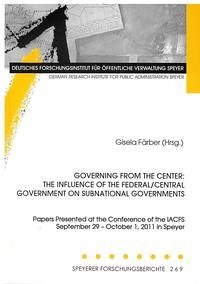In theory, federal states provide for a clear division of competences among the orders (or levels) of government. Federal constitutions determine the dis-tribution of the various tasks as well as the most important institutions and the rules of cooperation among them. Both vertical and horizontal divisions of powers limit the overall power of the state. From the economic point of view, federal constitutions safeguard the efficiency of the supply of public goods by establishing institutionally preset conditions for making political decisions when regional preferences differ and by instituting a horizontal competition among jurisdictions. In practice, however, federal arrangements in all countries depart from this clear separation of competences, with pervasive formal and informal cooperation in decision-making processes and in the production of public goods. The Federation or “central state” in particular routinely becomes involved in the provision of public goods by subnational governments, affecting their policy initiatives through a variety of federal institutions, measures, or processes. This may lead to a vertical imbalance within the federal system, because the subnational units do not have a similar influence on the policy initiatives of the Federation. The vertical influences tend to be rather indirect – for example, in the field of general economic policy affecting price level and inflation rate, interest rates, wages and the base of revenues and expenditures of the decentralised jurisdictions. They may also involve direct influences or even interventions when specific responsibilities are transferred and when the Federation regulates in detail the conditions for the supply of those public goods that fall within the responsibility of states, provinces, and communities. In some federal states – for example, in Canada – interventions by the Federation may affect local governments, overleaping the provincial/state level, with the Federation oftentimes using financial transfers to accomplish this. But in Germany, for example, the federal Constitution was amended to restrict such interventions by the Federation.

